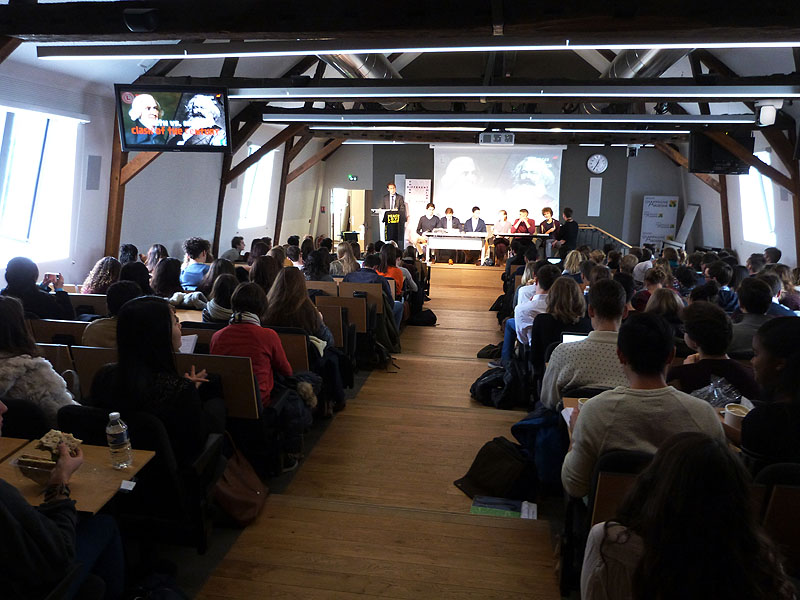By Marion Lefèvre
Pictures by Joanna Lancashire
Until last Wednesday, there had never been a real organized clash between two radically opposed schools of thought on this brand-new campus. Lack of time or lack of will, that no one could tell. Still, a first – and heated – debate on neoliberalism and its most recent incarnation, the Trans-Atlantic Free Trade Agreement (TAFTA) took place between Sciences Publica, a non-politically aligned association thought to be generally to the left of the political spectrum, and Think Libéral, a self-defined liberal association. The debate was introduced by Pr. Olivier Ruchet and commented by Pr. Ellen Hampton.
Symbolically “opposing” Adam Smith, father of liberalism, and Karl Marx, father of communism, this Clash of the Century was already promising on paper. As I sat in the second row of the amphitheater, I realized it was certainly going to be much more than that. First, even though I arrived rather early, the room was already filled and ready to burst. “You come to Sciences Po because you have an interest in politics,” said Pr. Ruchet in his opening speech. “This is exactly what we expect of you”. Obviously, the student body had answered the call.
In his opening speech, Olivier Ruchet introduced a quick yet masterful depiction of the main challenges and questions the TAFTA raised. Why is there a need for such a treaty? Does it follow from a global trend or rather does it engage a new one? How is the treaty negotiated and by whom? Indeed, what are the arguments of each party? Taking his prompts from the European Commission website, Pr. Ruchet, took great care to avoid bias while introducing the topic and giving a strong basis on which further discussions could be built.
Even though the TAFTA is mainly a free-trade agreement, it goes (as the NAFTA two decades ago) farther than that. According to the European Commission, the United States and the European Union share “common values”, from economic liberalism to human rights and transparent democratic principles. Will this agreement bring growth, or rather increase unemployment? Is it the best vehicle to promote those “common values”? Will we go further in this partnership? Willingly leaving those questions unanswered, Olivier Ruchet opened the floor to both associations.
Think Libéral and Sciences Publica each opened with a speech, delivered by Tolga Bozkaya and Teddy Paikin respectively. From there followed a series of rebuttals which I will summarize here, to allow the reader to be able to follow the hectic and sometimes messy debate that ensued. On the economically liberal side, Tolga Bozkaya, Juan Munoz, and William Labasi-Sammartino. Arguing against them, Teddy Paikin, Lyndsay Morrow and Giuseppe Procida. Unsurprisingly, the debate was polarized around three main issues: how the TAFTA was to impact growth and labor (employment rates but also labor rights and protection), consumer and human rights, state sovereignty.

Tolga Bozkaya delives the first (liberal) speech
Growth, employment and labor rights: incredible boost or huge threat?
ThinkLibéral opened the debate by arguing that the TAFTA was going to benefit not only big corporations but also small and midsized businesses, by leveling the playing field in terms of taxes and ensuring high labor rights standards as announced by the World Trade Organization (WTO). Moreover, the treaty will boost the stagnating European growth rate by increasing productivity. Sciences Publica opposed these claims, arguing that more competition was likely to bring down small businesses who could not cut prices to stay in the game. They also quoted the very father of the Growth Domestic Product (GDP), Simon Kuznets, making it obvious that since the beginning this index was clearly limited and flawed in its evaluation of economic performances.
Consumer and human rights: as many kings as there are clients, truly?
From the opening of the market to cheaper U.S. goods, ThinkLibéral deduced that the consumers were to benefit from TAFTA since the cost of living would significantly decrease. In a rather exalted speech, Juan called free trade a “social revolution” that was slowly biting off the “last conservative bastions” holding onto the welfare state and 34-hour week. People were to be allowed to choose the goods they could buy, and not politicians. Decreasing the role of the state on the market was a way to “move towards a dynamic environment” that would not be burdened by, for instance, a feat of “how social security” might fail. Rather scandalized, Teddy Paikin wittily thanked “Mr. Trump” for his enlightening speech and ceded the floor to Lyndsay. Through the definition she gave of neoliberalism (that is to say, privatization, deregulation and austerity), she showed that to benefit locals, a free-trade agreement would need to include income redistribution. Moreover, taking the example of NAFTA, she argued that the wealth gap had increased since its implementation, showing the negative effects such an agreement could have on everyday people.
State sovereignty: a strictly limited state or an enlightened interventionism?
Giuseppe was the first to raise the issue of the Investor-to-State Dispute Settlement (ISDS), a mechanism that would allow companies (“investors”) to sue States when they implement regulations that impact trade negatively. Pointing out that the lawyers working in this dispute settlement would be chosen by companies themselves and be paid incredible amounts of money to solve the companies’ worries, he claimed that States would be obliged to pay reparations even if they did not want to companies and that, to top it all, those deliberations were to happen in total opacity. Lyndsay took the argument and added that States were in the long run going to have to “bend to the will of corporations”. “It’s a matter of moving on”, dismissed Juan, with many hand gestures and an eloquent conclusion.

Pr. Hampton then asked a question that puzzled debaters and remained unanswered: does Google support TAFTA? In other words, would Google privilege its brand image over its direct economic interests? To be continued. Eventually, the floor was opened to questions from the audience. From environmental considerations to the relevance of the ISCS and the Western-centricity of TAFTA, spectators revealed themselves to be extremely insightful and responsive. It is of course hardly possible to determine who “won” this heated confrontation, but one thing is certain: an hour at lunch is definitely not enough to wear out our contestants. Around a coffee or a table, I believe it is safe to bet that, if you casually bring back the topic, you will without a doubt trigger further and more interesting discussions.
Other posts that may interest you:
- The Trouble with ‘Ecocide’
- Carbon dioxide removal – hit or miss?
- Local Victories for Turkish Opposition — A Sign of Hope?
- Are France and Japan a Mismatch Made in Heaven?
- A Reflection on Dark Tourism
Discover more from The Sundial Press
Subscribe to get the latest posts sent to your email.




